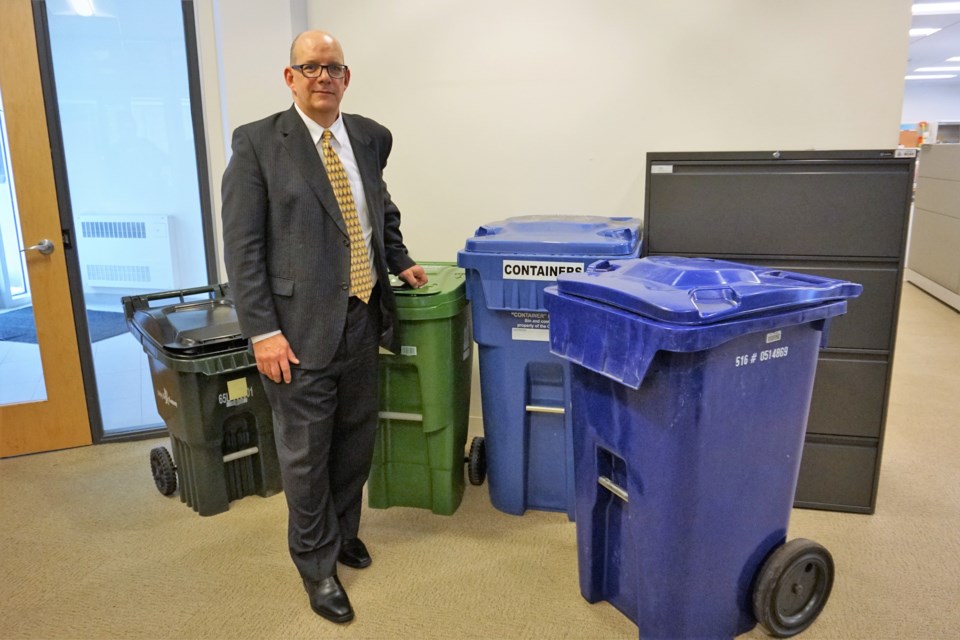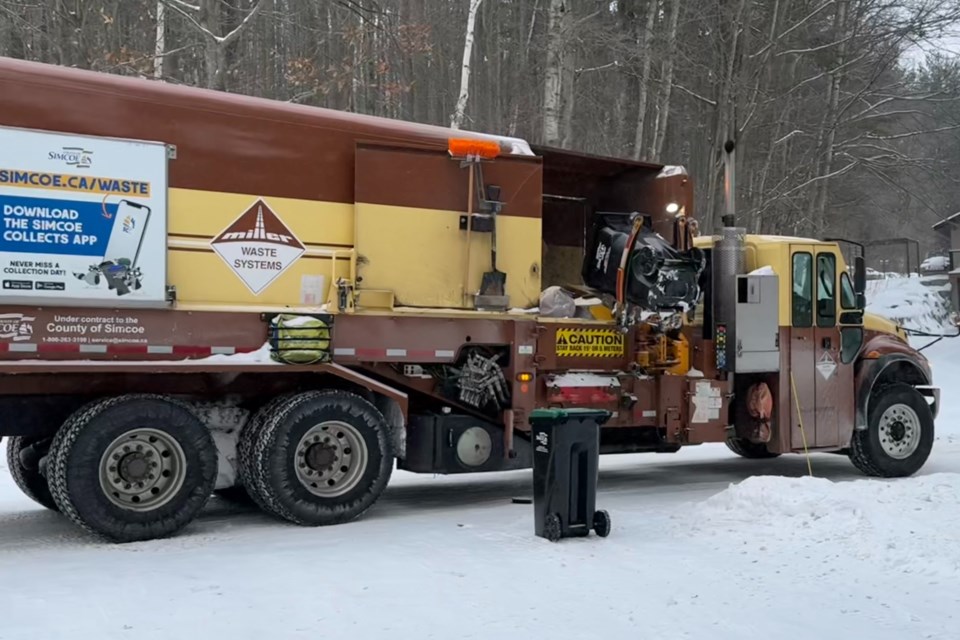Editor’s note: The following does not affect residents in the separated cities of Barrie and Orillia, which each handle their own waste management.
The County of Simcoe will stop providing recycling services to industrial, commercial and institutional properties.
Beginning on Jan. 1, 2026, ineligible sources — where producers are not responsible for collection as of that date — include businesses, places of worship, daycares, campgrounds, public-facing and internal areas of municipal-owned buildings, and not-for-profit organizations, such as shelters and food banks.
The scope of the changes was explained by Laura Barrett, manager of waste collections, during a presentation to county councillors at Tuesday’s committee of the whole meeting.
The blue box regulation established recycling producers are responsible for the end-of-life management of these products from “eligible” sources. This includes residential locations, schools, and non-profit long-term care homes/seniors residences.
That same regulation says producers are therefore not responsible for the management of recycling from the industrial, commercial and institutional sectors. But it’s not a municipal responsibility, either.
Barrett explained these locations are not required through the regulation to have recycling collected curbside or the management of any recycling anywhere, which then places the onus on municipalities to decide if they are going to take on that responsibility.
“Blue box regulations stipulate that the producers of recycling, the Coca-Colas and Pepsis of the world, are now responsible for recycling,” she said.
They can receive a producer-responsibility (PRO) designation to take care of the system, with Circular Materials Ontario (CMO) being the main PRO, Barrett added.
Legislation has given CMO the ability to make the decisions for the collection of these materials, she said. The transition, which began on Jan. 1, 2024, has been successful, she noted, adding it’s slated to continue until Dec. 31, 2025.
CMO will be responsible for acting on behalf of producers to set up the collection system.
If the county were to provide recycling services to ineligible sources, the collected materials would have to be separated from eligible materials and the county would be required to oversee the collection, transportation and processing, assuming 100 per cent of the costs, councillors heard.
To date, residents would not have seen any difference in their recycling collection as the transition occurs.
“We are only in the background seeing a difference in where the recycling is going,” Barrett explained.
She expects significant changes will be seen “post-transition,” but she is unsure what they will look like.
County staff have conducted an assessment to determine how many industrial, commercial and institutional (ICI) properties there are and how many the county services.
“We have approximately 5,600 … and we only service about 2,100. This really only represents 1.4 per cent of all of the serviced units in the County of Simcoe,” Barrett said.
For those 2,100 locations, and for all residents, the county accepts recycling in a maximum of two carts with some overflow allowed, she noted. However, many of the ICI locations require a larger, front-end bin for which the county does not provide service.
“Larger locations currently do not receive recycling collection by the County of Simcoe, but the smaller properties do,” Barrett said.
After the transition takes effect, staff recommend the county discontinue the collection of recycling at all ineligible sources, a recommendation that was approved later in Tuesday’s meeting.
“Many people think recycling makes us money, so it doesn’t cost us anything. While revenue is received … the cost to collect, transfer and process actually outweighs the revenue we receive,” Barrett said. “With discontinuing curbside collection, we would continue to receive recycling, regardless of the source, for a fee at all waste management facilities starting in 2026.”
This would mean both businesses and residents would be required to pay that fee, which has yet to be set.
“We would encourage residents to continue to put their material curbside, as CMO is required to service residents,” Barrett said. “CMO is also required to set up locations for residents who don’t have curbside collection, (but) as of yet, we have not heard what their plan is for that.”

Rob McCullough, the county’s director of solid waste management, said it’s a strange case that had staff arguing against increased diversion.
“That’s not something we want to do. We are very much environmentalists and we really want to divert as much material (as possible) … but there is real rationale behind this decision as we don’t have a mandate,” he said.
“We are not required by legislation to provide this service to anything other than residential, and now that that residential requirement has been removed from us, it makes it very difficult to consider just a program for the (ICI) sector.”
The reason for that would be cost prohibitive, he said, estimating the cost could be six to seven times the existing cost per location.
“Right now, we track how many kilometres the collection trucks drive. For every 100 kilometres a truck drives, they pick up from 446 units,” McCullough said. “If we were to set up a contract just for that, they would pick up (at) six locations and the environmental impact due to increased greenhouse gas emissions due to more trucks on the road would be difficult to support.”
There would also be major logistical challenges in doing so, given the size of the county, he added.
“Don’t get us wrong; we completely support the legislation. We think the direction they are going, making producers responsible, has some major advantages going forward in reformulation of packaging,” he said.
“However, we think they should have made all producers responsible for everything they generate, not just for what they generate that gets sold to residential units, schools, and not-for-profit long-term care homes.”
The concept of extended producer responsibility “absolutely makes sense,” said Innisfil Mayor Lynn Dollin.
“I am not under an illusion that this isn’t going to take some political fortitude,” she added. “You know everything is our fault — it doesn’t matter if it’s a bad teacher or climate change … so when it comes down to a small business not getting their recycling picked up, they’re going to come and complain to us.”
She said the key will be getting the message out.
“The communication has got to be very strong that this is not our responsibility,” she said.
The change is going to be perceived as the county stepping back from recycling, added Bradford West Gwillimbury Coun. Jonathan Scott.
“Regardless of if it’s the county’s fault, we will get the blame. This is a really unfortunate situation we find ourselves in ... I get the logic, but it doesn’t mean we are happy about it,” he said.
“(We are) attempting to find the lesser evil, but I still don’t like (any) evil at all.”
Bradford West Gwillimbury Mayor James Leduc said he struggled with the recommendations in the report and would not be supporting it.
“I want to be a leader. We do a great diversion now,” he said. “There are just too many negatives when you talk about removing the service. It’s our small businesses, it’s our mom-and-pop shops ... and, yes, we are going to deal with it at our level. It’s a decision we are all going to pay for down the road.”
The vote, which was not unanimous, will need to be ratified at the next council meeting.
Councillors also approved a motion for the warden to send a letter to Andrea Khanjin, minister of the environment, conservation and parks, who is also MPP for Barrie-Innisfil, advocating for the inclusion of ineligible sources in the regulations.



